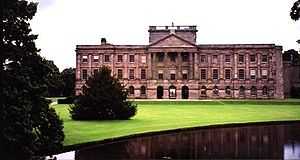Baron Newton
From Wikipedia, the free encyclopedia
- "Lord Newton" redirects here; for the Scottish advocate and judge, see William Oliphant, Lord Newton.

Lyme Park, the former seat of the Legh family
Baron Newton, of Newton-in-Makerfield in the County Palatine of Lancaster, is a title in the Peerage of the United Kingdom.[1] It was created in 1892 for the Conservative politician William Legh, who had earlier represented Lancashire South and Cheshire East in the House of Commons. Both his son, the second Baron, and his great-grandson, the fourth Baron, were Conservative government ministers. As of 2010 the title is held by the latter's eldest son, the fifth Baron, who succeeded in 1992.
The seat of the Legh (pronounced "Lee") family was Lyme Park near Disley in Cheshire. It was given to the National Trust in 1946 by the third Baron Newton.[2]
Barons Newton (1892)
- William John Legh, 1st Baron Newton (1828–1898)
- Thomas Wodehouse Legh, 2nd Baron Newton (1857–1942)
- Richard William Davenport Legh, 3rd Baron Newton (1888–1960)
- Peter Richard Legh, 4th Baron Newton (1915–1992)
- Richard Thomas Legh, 5th Baron Newton (b. 1950)
The heir apparent is the present holder's son the Hon. Piers Richard Legh (b. 1979)
Notes
- ↑ The London Gazette: no. 26328. p. 5384. 23 September 1892.
- ↑ Waterson, Merlin (1975). Lyme Park. National Trust. p. 8.
References
- Kidd, Charles, Williamson, David (editors). Debrett's Peerage and Baronetage (1990 edition). New York: St Martin's Press, 1990,
- Leigh Rayment's Peerage Pages
This article is issued from Wikipedia. The text is available under the Creative Commons Attribution/Share Alike; additional terms may apply for the media files.